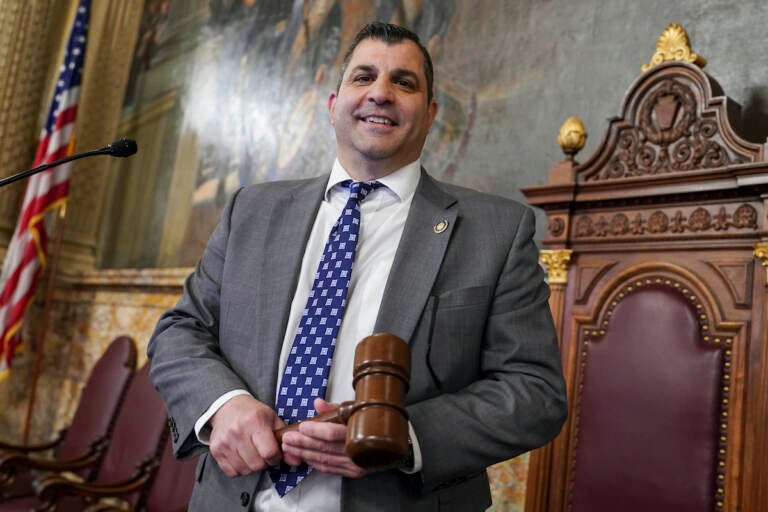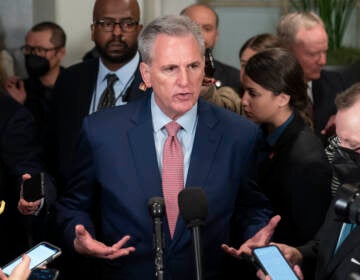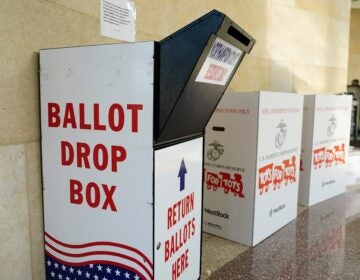Democrats and a handful of Republicans picked the Pennsylvania House’s new speaker
State Rep. Mark Rozzi of Berks County was named as the next presiding officer with 115 votes.

Pennsylvania Speaker of the House Mark Rozzi is photographed at the speaker's podium, Tuesday, Jan. 3, 2023, at the state Capitol in Harrisburg, Pa. (AP Photo/Matt Smith)
This story originally appeared on Spotlight PA.
Pennsylvania House Democrats and a handful of Republicans joined together Tuesday to pick the chamber’s new speaker — but not the person most expected.
State Rep. Mark Rozzi of Berks County, a survivor of childhood sexual abuse who has pushed for the creation of a civil window to bring lawsuits against abusers, was named presiding officer with 115 votes. All Democrats voted for Rozzi, as did 16 Republicans including those in leadership.
Going into Tuesday, the chamber’s razor-thin margin led to intense clashes between Democratic and Republican leadership over control and great uncertainty over who exactly would win enough votes to become speaker. Rozzi’s selection surprised many Capitol watchers, as his name had not been publicly floated for the position. But what he did next was perhaps even more shocking.
In remarks made after his selection, Rozzi, who was elected as a Democrat, announced he would no longer caucus with the party and would become independent.
“The commonwealth that is home to Independence Hall will now be home to this commonwealth’s first independent speaker of the House,” Rozzi said on the floor Tuesday. “I pledge my allegiance and my loyalty to no interest in this building, to no interest in our politics. I pledge my loyalty to the people of the commonwealth.”
The position of speaker is critically important. They have the power to moderate floor debate, call up bills for votes, and name the chamber’s committee chairs.
Until late Tuesday afternoon, Democrats had publicly maintained that state Rep. Joanna McClinton (D., Philadelphia), who serves as caucus leader, was their only pick for the role. She would have been the first woman to hold the gavel.
However, after the chamber tied on a motion to adjourn, state Rep. Jim Gregory (R., Blair) nominated Rozzi. Gregory is also a survivor of childhood sexual abuse and has worked closely with Rozzi on the issue.
Gregory later told Spotlight PA he and Rozzi had discussed the option of Rozzi running for speaker for “months.” But he said he didn’t bring the idea to his party leaders until around 2:30 Tuesday afternoon, when the chamber appeared on the verge of recessing without choosing a speaker.
“They were not aware,” Gregory said. “I made a suggestion to them. ‘Go to Mark Rozzi, I think you might be able to do it.’ And they did.”
State Rep. Bryan Cutler (R., Lancaster), who served as speaker last session and will lead the GOP caucus moving forward, said this year’s narrowly divided state House body was always going to require compromise in order to get anything passed. Now, with Rozzi declaring himself independent, Cutler said that’s even more necessary.
“Even at a full complement, we’re going to be at 101, 101, and one,” he said. “It’s going to necessitate all of us working together.”
In the weeks leading up to Tuesday — the first day of the legislature’s new two-year session — Democrats and Republicans waged a very public battle over which party rightfully controlled the chamber.
Democrats won 102 seats in November, flipping the chamber from Republican control for the first time since 2010. But on Tuesday, three of those seats were vacant. One was previously held by a lawmaker who died too close to Election Day to be taken off the ballot, and the other two were held by legislators who stepped down after winning other elected offices.
Those vacancies left Republicans with 101 members to Democrats’ 99. That tally gave the party a functional majority and left Democrats’ choice for speaker, McClinton, in need of GOP votes to take the gavel.
All three empty seats will be filled by special elections, which Democrats are likely to win. But exactly when two of those elections will be held is in dispute.
Democrats want to fill all three seats in early February, while Republicans argue two elections should be held in May at the same time as the off-year primary. The matter is currently being considered by the state’s appellate courts.
As Tuesday approached, Democratic and Republican leaders met intermittently to discuss a potential deal. Democrats pitched a number of compromises in exchange for their choice of speaker. At one point, they offered Republicans 12 seats on each 25-member committee, as opposed to 10.
In an email to their members, first reported by City & State, Republican leaders alleged that Democrats asked GOP lawmakers to back the party’s candidate in exchange for access to grant money from Gov.-elect Josh Shapiro’s administration, a once-common tactic that has fallen somewhat out of favor in recent years.
Democrats, as well as a spokesperson for Shapiro, didn’t comment on those conversations, or on Shapiro’s involvement in the negotiations.
Republicans also faced internal divisions over who to nominate for speaker after Cutler said he wouldn’t run for the position again. In a closed-door vote Tuesday morning, the caucus settled on state Rep. Carl Walker Metzgar (R., Somerset), a backbencher with a libertarian streak, out of four candidates.
State Rep. George Dunbar (R., Westmoreland) formally nominated Metzgar for speaker, but he won just 85 votes to Rozzi’s 115.
“We had members of our caucus that were vacillating on where they were going to be,” Metzgar told Spotlight PA, “and that created a dilemma that others were able to take advantage of.”
He added that he was disappointed in the outcome and that only time will tell if Rozzi will stay true to his promise of independent-minded leadership.
Democrats also expressed surprise at the outcome, which robs them of having a majority even if they sweep the upcoming special elections.
During floor remarks, McClinton, who will continue serving as Democratic leader, called Rozzi a “true leader” and said her caucus supported him. House Democratic leadership joined Rozzi in the speaker’s office soon after the vote, although they offered no comment.
State Rep. Manny Guzman (D., Berks) said that he didn’t expect the outcome but trusted the record of his colleague.
“While he may say that he is an independent at heart and in mind, I know based off his history and based off of what he’s advocated for in the past, that his heart is with Democratic values and I anticipate his speakership to reflect those values,” Guzman said.
This isn’t the first time there have been complicated negotiations over state House control. In 2007, Democrats won a narrow majority but were unable to unite their caucus behind a single candidate for speaker — leading to a circuitous debate that saw both Democrats and Republicans argue that theirs was the platform and party of “reform,” while jockeying for advantage in the chamber.
Ultimately, a majority of Democrats allied with Republicans on a power-sharing agreement in which they nominated and supported a moderate member of the GOP, Denny O’Brien, who pledged to work closely with Democrats.
The day went as expected in the state Senate, where state Sen. Kim Ward (R., Westmoreland) was elected president pro tempore with unanimous support. Ward served as majority leader in the previous session, and she will temporarily serve as lieutenant governor until Democrat Austin Davis is sworn in later this month.
 Spotlight PA is an independent, non-partisan newsroom powered by The Philadelphia Inquirer in partnership with PennLive/The Patriot-News, TribLIVE/Pittsburgh Tribune-Review, and WITF Public Media.
Spotlight PA is an independent, non-partisan newsroom powered by The Philadelphia Inquirer in partnership with PennLive/The Patriot-News, TribLIVE/Pittsburgh Tribune-Review, and WITF Public Media.
WHYY is your source for fact-based, in-depth journalism and information. As a nonprofit organization, we rely on financial support from readers like you. Please give today.






